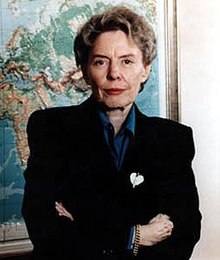Jeane Kirkpatrick
| Jeane Kirkpatrick | |
|---|---|
 |
|
| 16th United States Ambassador to the United Nations | |
|
In office February 4, 1981 – April 1, 1985 |
|
| President | Ronald Reagan |
| Preceded by | Donald McHenry |
| Succeeded by | Vernon Walters |
| Personal details | |
| Born |
Jeane Duane Jordan November 19, 1926 Duncan, Oklahoma, U.S. |
| Died | December 7, 2006 (aged 80) Bethesda, Maryland, U.S. |
| Political party |
Democratic (Before 1985) Republican (1985–2006) |
| Spouse(s) | Evron Kirkpatrick |
| Children | 3 |
| Education |
Stephens College Columbia University (BA, MA, PhD) |
Jeane Duane Kirkpatrick (née Jordan; November 19, 1926 – December 7, 2006) was an American diplomat and political scientist. An ardent anticommunist, she was a longtime Democrat who became a Republican in 1985. After serving as Ronald Reagan's foreign policy adviser in his 1980 campaign, she became the first woman to serve as US Ambassador to the United Nations.
She was known for the "Kirkpatrick Doctrine", which advocated supporting authoritarian regimes around the world if they went along with Washington's aims. She believed that they could be led into democracy by example. She wrote, "Traditional authoritarian governments are less repressive than revolutionary autocracies."
Kirkpatrick served on Reagan's Cabinet on the National Security Council, Foreign Intelligence Advisory Board, Defense Policy Review Board, and chaired the Secretary of Defense Commission on Fail Safe and Risk reduction of the Nuclear Command and Control System. She wrote a syndicated newspaper column after leaving government service in 1985, specializing in analysis of the activities of the United Nations.
She was born in Duncan, Oklahoma, the daughter of an oilfield wildcatter, Welcher F. Jordan, and his wife, Leona (née Kile). She attended Emerson Elementary School there and was known to her classmates as "Duane Jordan." She had a younger sibling, Jerry. At 12, her father moved the family to Mt. Vernon, Illinois, where she graduated from Mt. Vernon Township High School. In 1948, she graduated from Barnard College of Columbia University after she received her associate degree from Stephens College (then only a two-year institution) in Columbia, Missouri. In 1968, Kirkpatrick earned a PhD in political science from Columbia.
...
Wikipedia
